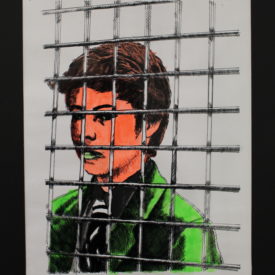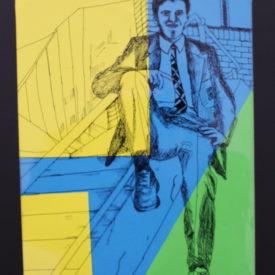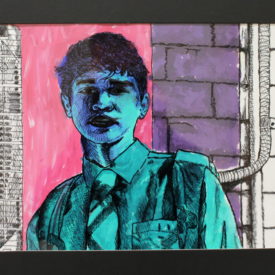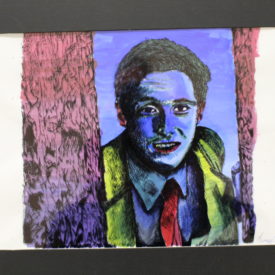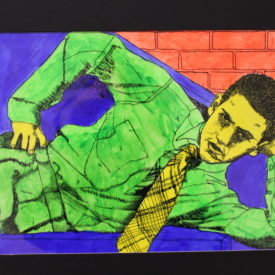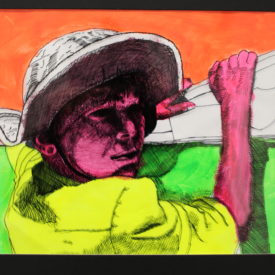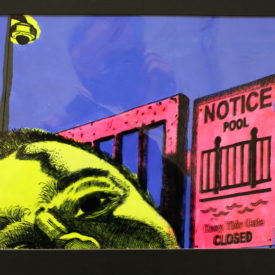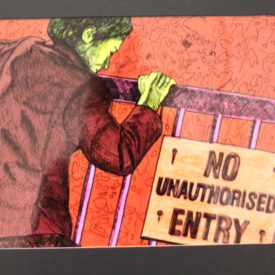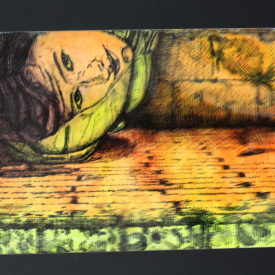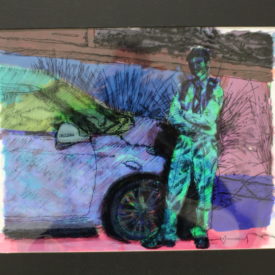Love ya, Mum, squeaked Sam, feet up on the dashboard. He loved to just look at her. Every time he admired something different: eyes, smile, skin. Teeth, teeth, teeth. He knew how special she was because she knew how special he was. And he knew she loved him because she’d kissed his knee when he tumbled in the back yard.
Now, do you know what we’re getting? chirped Mum, eyes forward. They glimmered from the shimmer of the bonnet.
Milk, eggs, butter and ham, chimed Sam.
Mother feathered his button nose.
***
The car rolled to a halt, Sam clipped out, dashed around, and leaned to let Mother out.
Thank you, love, she replied, tapping twice his wispy hair. She noticed how it swayed in the wind. The boy turned and moved beside her, filled by a dimpled grin.
Their hands joined without thought. His little warm mitten to her single ring finger.
Alright this is the plan, little man, announced Mum, pulling him from the blankness of the tarmac. You get the eggs and ham, and I’ll get the milk and butter.
Sam thumbed his teeth, hands on hips, left knee cocked.
I’ll time you.
Suddenly, the boy dashed, his cream socks curling past his ankles and flopping over his toes. He tumbled like a laundry dryer, quivering with excitement.
Brrrrmmmm, I’m open for piggybacks if you need them, guffawed Sam, noticing the ivory of milk cartons. He also saw the glint of yoghurt lid foil.
He stopped below a barricade of brands. Scanned, stretched, and on his tippy toes, lowered the eggs. He paused a moment, pondering where the ham lived, and then continued forward. The eggs roosted atop his head, housed by cupped hands. But then he remembered what had happened. How teeth had gone away. He shuffled the eggs to the front, nestling them under the squishy inner of his right arm.
’Scuse me, chirped Sam, faintly brushing an elderly man who brooded over meat. A chuckle, teeth present.
The boy’s mind drifted into the freezer.
By now, the backs of his feet had also become chilled by the floor.
But, just before he made it to where he was going, he saw it. Only just. A choccy Yogo. Almost without thought. Sam snatched the prize, eyes widening, he scurried back to the counter.
***
Mother continued to stack the items, grabbing them, and then Sam. Quick hug. Hands to their place.
However the boy’s smile soon collapsed. An awkward stillness. He began to quiver as he looked up to see Mother sheltered by his brow.
What’s that? she enquired, steadfast to her boy’s shake. I do not appreciate dishonesty young man. Put it back please.
His face tightened. Limbs, like a clinging monkey, latched to her leg. He remained tight.
Mama may I please have this one? Because I think that I would really love it.
Her shoulders loosened, tiring with her eyes. She refused to move for another hug.
Please put it back, she repeated as irregular crinkles appeared on the boy’s chin. Now.
He had forgotten that he was even holding the prize as he arrived back home. Not his home.
Crumply packages of crunchy chips bent from the shelves, calling his name. Head down, jaw rigid, chin folded. Sam also heard the glaring request of popular cereals. He remembered they held the components to the most important meal of the day. Again, thumbs surveying bumpy teeth, hands on hips. The boy resisted, pulling up his socks, pulling down his grin.
Sam slid to the chilled aisle. The boy was still shaken by Mother’s public frigidity. He felt his tummy rise as he looked up to return the prize. But, again, right there, the smooth scent chocolate milk bathed his imagination. Coco, Sugar, Milk. Sam’s fingers nipped up, grasping the chunkiest carton on offer. He held its hand. A whiff, still sealed. Still good. He skipped back to the counter. Snap, crackle, pop.
The boy didn’t even get close before Mother’s face drooped, slowing the flow of her chatter and unpacking. When Sam arrived, he realized that her nimble chatter had mellowed.
I know you didn’t want the last one, but this one is different because this one is from a cow, belled Sam behind the excitement of a growing smirk. With this one, I know that you like it.
The wrinkles around Mother’s eyes crowded. But, there was no laugh. With pursed lips Mother turned, apologised, finishing in an arch.
Listen, I told you to put one thing away and you didn’t. Instead, you came back with another, attested Mother. His soggy passionfruit eyes. Red, wet.
If you continue repeating mistakes then I won’t forgive you.
He couldn’t get back what he’d just lost. He was wrong.
Suddenly, the songs of biscuits, chips, chocolate all muted. Instead, a stillness sat fat as he skulked back to the aisle.
Red in the face, eyes down, he followed the infrequent crumbs which fed the floor. They clearly led to something. This fixed him only for a while, or at least until he noticed the lump that had risen in his throat.
With his head up now, Sam dithered among stacks of leathery cucumbers, dodging the flashes of coloured capsicums. Something buzzed in his chest. Offbeat. He tossed the chocolate back to its pile. By this time, he had scuttled most of the way back, his head dangling, when teeth showed again.
That’s what I could do, whispered Sam, flickering with joviality. He hurried past several prominent signs, lighting the path. Left arm stretching, he pocketed a pale blue hot water bottle.
He caught Mother’s agitated eyes, popping the item on the counter with seemingly mistaken confidence.
Mama, I know this is maybe not what you wanted, huffed Sam. But I need to do something, okay. And I just think about stuff you do for me and I find it really hard to forget that sort of thing.
Aghh Sam, sighed Mother. Sometimes it’s better just to do nothing.
The boy’s bottom lip curled; his eyes nestled behind water.
Think of a different way to show that you care.
Mother turned, nodded to the checkout lady and continued on her way. Sam’s palms grew cold.

